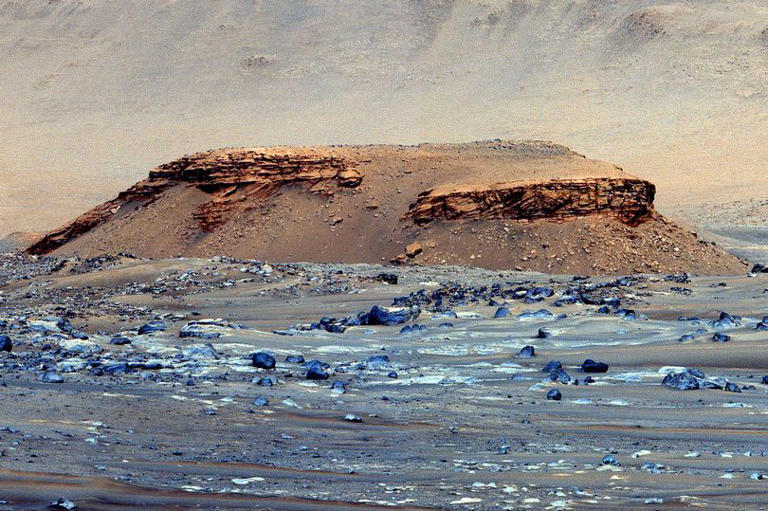Explore the intriguing Martian rock formation known as Bright Angel with NASA’s Perseverance rover. Learn about its discovery, scientific investigations, and potential implications for Mars’ past.

Mars was once a rich, watery world (Picture: Getty/iStockphoto)
© Provided by Metro
Table of Contents
ToggleMartian Rock Formation: Unveiling Bright Angel with Perseverance Rover
Martian rock formation Bright Angel has recently captivated scientists and space enthusiasts alike, thanks to NASA’s Perseverance rover. Situated near Neretva Vallis, a dried river channel on Mars, this unique geological feature stands out for its distinctive light-colored appearance. This blog delves into the rover’s journey to Bright Angel, its scientific investigations, and the significance of its findings.
Discovering Bright Angel
Perseverance rover, equipped with state-of-the-art instruments, embarked on a challenging journey across Martian terrain to reach Bright Angel. This rock outcropping, named for its luminous hue visible from orbit, lies near Neretva Vallis—a remnant of an ancient river system that once flowed into Jezero Crater, the rover’s landing site.
Unveiling Martian Mysteries
Upon approaching Bright Angel, scientists eagerly awaited the rover’s close-up images and initial data. The site’s geological formations suggest it may contain clues about Mars’ wetter past and the processes that shaped its surface over millennia.
Scientific Investigations Begin
Perseverance initiated its scientific exploration by employing its high-speed drill to perform a shallow dig. This process, known as abrasion, cleared away surface dust using nitrogen gas, revealing pristine rock layers beneath. Such meticulous analysis aims to uncover the composition and history of Bright Angel, offering insights into Martian geology that could reshape our understanding of the Red Planet’s evolution.
Deploying Advanced Technology: PIXL Instrument
To delve deeper into Bright Angel’s composition, Perseverance utilized its PIXL instrument—a cutting-edge device that emits X-rays to illuminate and analyze the Martian surface. This sophisticated technology enables scientists to study the elemental makeup of rocks, providing valuable data on their formation processes and geological context.
© NASA/JPL-Caltech
Potential Implications for Mars’ Past Habitability
The discovery of Bright Angel opens up possibilities for understanding Mars’ ancient environment and its potential for habitability. By studying the rock formations and sedimentary layers, scientists can piece together the planet’s geological history and assess its past conditions that may have supported life.
Collecting Martian Samples for Earth Return Mission
Looking ahead, the Perseverance mission contemplates collecting rock samples from Bright Angel for potential return to Earth. This ambitious endeavor could yield unprecedented insights into Martian geology, allowing scientists to conduct detailed analyses using advanced laboratory techniques unavailable on Mars.
Analyzing Data and Future Prospects
As data from Perseverance’s investigations at Bright Angel continue to be analyzed over the coming months, researchers anticipate uncovering new discoveries about Mars’ geological evolution. Each piece of information gathered contributes to a broader understanding of planetary formation and the potential for life beyond Earth.
Conclusion: Bright Angel and Beyond
In conclusion, the exploration of Bright Angel by NASA’s Perseverance rover represents a significant milestone in Martian science. This intriguing rock formation promises to unravel mysteries of Mars’ past, shedding light on its geological processes and environmental history. As humanity’s exploration of Mars progresses, discoveries like Bright Angel pave the way for future missions and deepen our appreciation of the Red Planet’s complex and dynamic nature.
By focusing on the Martian rock formation Bright Angel, this blog highlights the latest developments in Mars exploration and the ongoing scientific endeavors of the Perseverance rover. Stay tuned for more updates as humanity continues to unlock the secrets of our neighboring planet.